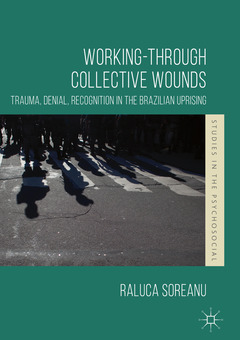Description
Working-through Collective Wounds, 1st ed. 2018
Trauma, Denial, Recognition in the Brazilian Uprising
Studies in the Psychosocial Series
Author: Soreanu Raluca
Language: English
Subject for Working-through Collective Wounds:
Approximative price 73.84 €
In Print (Delivery period: 15 days).
Add to cart
Working-through Collective Wounds
Publication date: 09-2020
247 p. · 14.8x21 cm · Paperback
Publication date: 09-2020
247 p. · 14.8x21 cm · Paperback
Approximative price 105.49 €
In Print (Delivery period: 15 days).
Add to cart
Working-through Collective Wounds
Publication date: 04-2018
Support: Print on demand
Publication date: 04-2018
Support: Print on demand
Description
/li>Contents
/li>Biography
/li>Comment
/li>
Working-through Collective Wounds discusses how collectives mourn and create symbols. It challenges ideas of the irrational and destructive crowd, and examines how complicated scenes of working-through traumas take place in the streets and squares of cities, in times of protest. Drawing on insights from the trauma theory of psychoanalyst Sándor Ferenczi and his idea of the ?confusion of tongues?, the book engages the confusions between different registers of the social that entrap people in the scene of trauma and bind them in alienation and submission. Raluca Soreanu proposes a trauma theory and a theory of recognition that start from a psychoanalytic understanding of fragmented psyches and trace the social life of psychic fragments. The book builds on psychosocial vignettes from the Brazilian uprising of 2013. It will be of great interest to psychoanalysts interested in collective phenomena, psychosocial studies scholars and social theorists working on theories of recognition and theories of trauma.
Introduction.- Part One: Trauma and the Symbol.- 1. Symbols.- 2. Magmas.- 3. Registers.- Part Two: Trauma and Denial.- 4. Memory-wounds.- 5. Phantasmas.- 6. Voracities.- Part Three: Trauma and Recognition.- 7. Faces.- 8. Coins.- 9. Oblique Lines.- Conclusions.
Raluca Soreanu is Wellcome Trust Fellow at the Department of Psychosocial Studies at Birkbeck College, University of London, UK. She is a practising psychoanalyst, associate member of the Círculo Psicanalítico do Rio de Janeiro and of the Instituto de Estudos da Complexidade, Brazil. She has published on psychoanalytic theory, psychosocial studies and the sociology of creativity.
Formulates a theory of collective trauma and a theory of recognition
Discusses how collectives mourn through protest
Builds on the trauma theory of psychoanalyst Sándor Ferenczi and his idea of the ‘confusion of tongues’
© 2024 LAVOISIER S.A.S.




